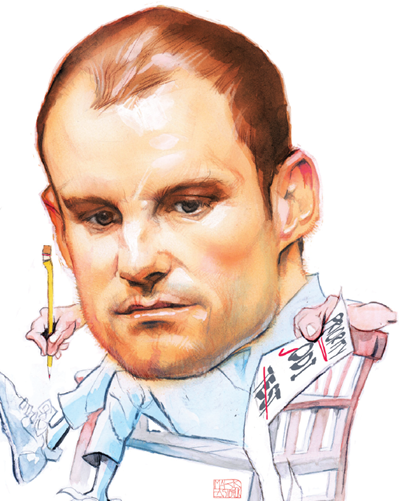by Peter Hayter
With his stentorian tones, Radley College and Durham University education and entirely apt nickname of Lord Snooty, Andrew Strauss does not come across as everyone’s idea of a revolutionary.
But the present thoughts of the director of England cricket come as close to a declaration of war on the traditional assumption that Test cricket is the only international cricket worth bothering with as we have heard.
Expressing a desire to prioritise “white-ball” cricket, and to channelling great efforts and focus on trying to win the next World Cup is one thing.
Supporters who have waited in vain for England to land one of those beauties since the first tournament was played here in 1975 have heard it all before.
In truth, they have probably lost count of the number of times captains, coaches and chairmen of selectors have invited us to share their vision of a brave new world, or a four-year plan, or of split coaches, or picking specialist batsmen/bowlers/all-rounders, including pinch hitters and “death” bowlers and the like, and the best of all, “multi-dimensional” players, aka jacks of all trades, masters of none.
But what Strauss came up with in Abu Dhabi this week was something else entirely.
The former England Test and ODI captain had spoken previously of the need to explore the possibility that certain players would not only be better suited to the shorter forms of the game, but also should only be considered for selection in 50-over and t20 international cricket, an overall approach he called “separation”.
And he is right.
Just as Alastair Cook was told before the last World Cup catastrophe he must concentrate solely on Test cricket, with the benefit of such an approach now blindingly obvious to him and everyone else, no matter how much lip service Eoin Morgan pays to the idea of eventually resurrecting his Test career, it is now clear beyond all argument that England’s ODI and t20 skipper should not be going anywhere near “red-ball” cricket for them ever again.
In due course, it may become apparent that the same should apply to Jos Buttler, who should surely be released to play the type of cricket in which he excels rather than be asked to adapt to a form so unsuited to his unique talent.
The idea that would have caused most consternation among the old guard, however, was the concession Strauss made to the notion that a player such as Joe Root, England’s only world-class batsman across all formats, might, in future, be rested from playing Test cricket for England in order to take part in the highest profile domestic t20 competitions such as the Indian Premier League, the Big Bash and The Ram Slam.
The rationale behind such radical thinking was plain, according to Strauss. Not good enough. Must do better. Or else.
“The last World Cup was a great demonstration of the fact that a lot of other players playing t20 competitions around the world are being challenged to think of different ways of playing the game,” he said.
“We have a lot of ground to make up in a short space of time, especially if we are serious about performing well in the Champions Trophy in 2017 and giving ourselves the best chance of winning the 2019 World Cup.
“We need to do things differently because if we keep doing the same things we will get the same results.”
Strauss pointed to the example of David Willey, given permission to miss an England Lions tour this winter in order to play t20 cricket Down Under, as evidence of how seriously he and those running the England team are now taking the need for their players to catch up with the rest in terms of the skills under pressure now deemed vital for success not only in t20 but also 50-over cricket.
Yet, while the young all-rounder is clearly a player of immense potential, it is hard to see how he might fit into an England Test team of the future.
The problem arises when such thinking is applied across the board.
As the best ODI sides have demonstrated, the very best players, such as Root, tend also to be your best Test players.
So the question is what happens if you feel the need to expose someone like him to the sort of specific short-form game experience that might make all the difference to England’s chance of actually delivering what Strauss and his bosses crave?
And now the answer is out in the open.
“I think it is almost inevitable that players may be rested from the Test team with a view to a one-day series,” said Strauss.
“We need to get better in white-ball cricket. Our skills need to be better, our thinking needs to be better and we need to challenge ourselves and experiment more and we can’t do that if people are playing a Test series the week before a one-day series.
“What I will say is that we have to look at the next four years and ask at what times are we prioritising ODI cricket and at what point are we prioritising Test cricket?
“No one wants to see the Test side going on the slide.
“It is really important we get to No.1 in Test cricket. That is a massive undertaking.
“Winning the Ashes is a massive undertaking. But there will be times in between when it is even more important that we are really focused on white-ball cricket, on getting the best side on the park and making sure they are prepared for the big events otherwise everyone, the players themselves and our game as a whole, will still see Test cricket as just being the only thing we are interested in.”
Pyjama cricket being put ahead of Test cricket on the list of priorities?
Players being rested from the latter to concentrate on the former?
Time was when such talk would be considered revolutionary nonsense. And many will see this as the thin end of the wedge.
But re-live the pain of England’s last World Cup in Australia and New Zealand and of all the others stretching back 40 years, save that brief glimmer of daylight in 1992, and now the thoughts of director Strauss just sound like common sense.












